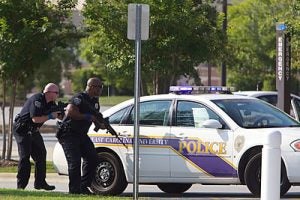Shooter drill tests emergency preparedness on Health Sciences Campus
It was only a drill, but police officers and preparedness officials at East Carolina University got a taste Aug. 2 of what it might be like if a worst-case public safety emergency unfolded on the Health Sciences campus.
In an active shooter exercise dubbed “Operation Spy Glass,” two suspects opened fire on a police officer in front of the College of Nursing before taking six hostages. In the end —according to the scenario set by the drill — an officer, a suspect and a hostage died.

ECU police officers participate in an emergency drill Tuesday, Aug. 2, at the Health Sciences Building. Photo by Cliff Hollis
“We hope a scenario like this never happens,” said Bill Koch, associate vice chancellor for environmental health and campus safety. “They are very rare, but we have to be prepared so if there is an incident on or near campus, we’re better prepared.”
The drill gives agencies a chance to build on existing relationships. “It gives you a chance to see how all these people are going to work together,” said Ted Sauls, a Greenville Police Department patrol captain.
“We can look at the what-ifs on paper, but this puts it out there in the elements, in the heat, with actors who act the role of perpetrators,” said Derrick Duggins, director of planning and design for EnviroSafe, a Graham-based firm hired by the UNC system to conduct drills on member campuses. “This gives us that practice on the ground.”
The university conducted a similar exercise on May 18, 2010, that included a simulated hostage-taker in White Residence Hall on main campus.
ECU Police Chief Scott Shelton said last year’s drill helped identify needs, which resulted in the department buying additional equipment and increasing tactical training.
“The safety of our students, faculty and staff on campus is a priority,” he said. “We’ve stepped up to increase training in reacting to these situations.”
Dr. Steven Sligar, associate professor of rehabilitation studies in the College of Allied Health Sciences, was an observer at the drill. He graduated from Northern Illinois University, the scene of a Valentine’s Day 2008 shooting where five people were killed and the gunman, a graduate student, committed suicide.
Sligar isn’t preoccupied with something similar happening at ECU but he knows the possibility exists.
“It kind of is a little tape running in the back of your mind, but if it stays in the front, you wouldn’t be able to function,” he said. “Ninety-nine point nine percent of students are good guys.”